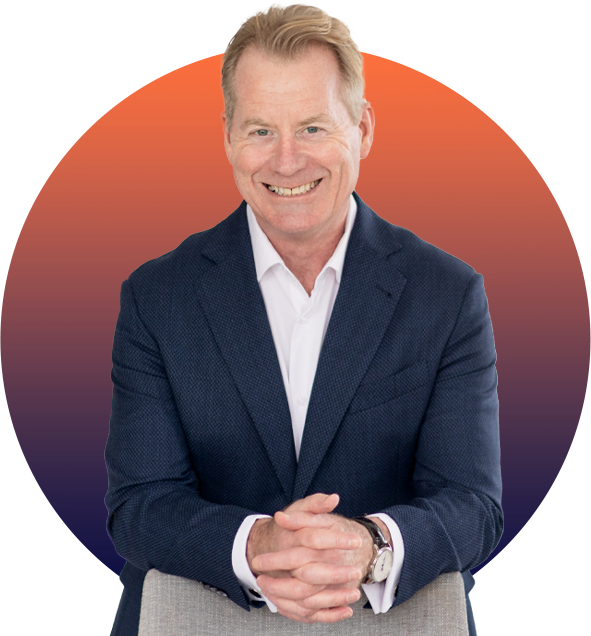With Martin G. Moore

After the recent untimely passing of Foo Fighters’ drummer, Taylor Hawkins, I came across an article in Rolling Stone magazine. It was Hawkins’ last live interview, and I was struck by a few incredible leadership lessons about fear of failure, strong leadership, and teamwork.
In today’s episode, I not only want to pay tribute to Taylor Hawkins (who was one of my favorite drummers), but also to take the learnings from the unexpected world of rock music to illustrate some behaviors and strategies that all leaders can learn from.
The opportunity that leaders have to create astonishing results by giving their people space to grow, and increasing their confidence to perform, is brought to life in the story of Hawkins and Dave Grohl, the Foo Fighters’ frontman.
Generate Your Free
Personalized Leadership Development Podcast Playlist

As a leader, it’s essential to constantly develop and improve your leadership skills to stay ahead of the game.
That’s why I’ve created a 3-question quiz that’ll give you a free personalized podcast playlist tailored to where you are right now in your leadership career!
Take the 30-second quiz now to get your on-the-go playlist 👇
Transcript
A few weeks ago, Taylor Hawkins, the longtime drummer of the band Foo Fighters, sadly passed away while on tour in South America. As well as being recognised as one of the preeminent rock musicians of the last few decades, he was also universally hailed as a person of great humility, generosity and humor. I saw the Foo Fighters perform live on several occasions, all in big stadium settings, and they were absolutely incredible to watch. You could see that the band members pride themselves on their musicianship and they share the same characteristics of any truly successful person: strong work ethic, a fundamental love for what they do, a commitment to going above and beyond, and a genuine level of care for the customer – their audience.
So what on earth does this have to do with leadership? You ask? Well, I came across an article in Rolling Stone magazine from June of 2021, which was Hawkins’ last live interview. In those pages, I was struck by a few incredible lessons about fear of failure, strong leadership and teamwork. In today’s episode, I not only want to pay tribute to Taylor Hawkins, who has my favorite drummers, but also to take the learnings from the unexpected world of rock music to illustrate some behaviors and strategies that all leaders can learn from. In a slightly different format, I’m simply going to go through some of my key takeaways from the interview and from Hawkins’ time with the Foo Fighters to draw some parallels with the world the rest of us live in.
So let’s get into it.
FOO FIGHTERS: A BRIEF BACKGROUND
The Foo Fighters was formed in 1994 in Seattle, Washington. This was the home of grunge music. And Dave Grohl was the founding member. Grohl was the former drummer of Nirvana, so by the time he formed the Foo Fighters, he had already had his fair share of fame. He started the band as a one-man project before recruiting some players from local bands like Sunny Day Real Estate. Now, this is where he found the Foo Fighters’ first drummer, William Goldsmith, who left the band a couple of years later to make way for Taylor Hawkins – but more on this shortly. As I recall this episode, the Foo Fighters have won 12 Grammy awards, including Best Rock Album four times, they were inducted into the Rock and Roll Hall of Fame in 2021 – their first year of eligibility – and Hawkins was a critical part of their success for 25 years.
Now, the first observations I want to make, go to the heart of the Foo Fighters’ culture. You can’t deny their success, not just commercially, but also the critical acclaim they’ve achieved. They pride themselves on being musicians. Sounds weird, eh? In 2012, they won five Grammy awards off the back of their album Wasting Light. Now, this was an incredible album because it was recorded in analogue rather than digital. So old school – no bells and whistles. Dave Grohl made a phone call to a guy by the name of Butch Vig, who’d produced Nirvana’s classic album, Nevermind, and was also a founding member of the band Garbage. And when Butch Vig heard that he wanted to record the album on analogue audio tape in Grohl’s garage studio in California, he said, “Okay, I’ll do it. But you guys have to play really well. I can’t fix anything in post production.” And they did.
And the rest is history. So in his acceptance speech at the Grammys that year, Dave Grohl said:
“Rather than go to the best studio in the world down the street in Hollywood and rather than use all of the fanciest computers that money can buy, we made this one in my garage with some microphones and a tape machine… To me this award means a lot because it shows that the human element of music is what’s important. Singing into a microphone and learning to play an instrument and learning to do your craft, that’s the most important thing for people to do. It’s not about being perfect, it’s not about sounding absolutely correct, it’s not about what goes on in a computer. It’s about what goes on in [your heart] and what goes on in [your head].”
I love that quote because it touches on so many critical leadership themes.
OBSERVATIONS FROM WASTING LIGHT
1. Do the work
Now this applies just as well to leadership as it does to rock music. Don’t rely on smoke and mirrors. Don’t try to compensate for lack of the fundamentals in your leadership capability, by distracting those around you with other things. Don’t believe your own bullshit, as so many leaders do. Learn your craft and learn it well – if you don’t, you’ll effectively build your house on a foundation of sand. It will be unstable, tenuous and fragile. Leadership’s hard work, so don’t avoid it. Face into it and be an active part of the process that brings exceptional results to your organization and to every individual you lead. Anyone who tells you to fake it until you make it is full of shit. Be honest and open about where you are, where you are going and what you’re prepared to do to get there.
2. If you can rally people around a compelling vision, the results can be absolutely stunning
The concept of putting it all on the line to produce something special and working without a net – as the Foo Fighters did – is really powerful. But it means you have to have the best people around you all committed to the vision and to achieving the right outcome. Some might even go so far as to call this a high performing team.
3. Excellence over perfection
The Foo Fighters’ music was not perfect, but it had a level of raw authenticity and grittiness that connected with their fan base. The beauty of the music was, in part, due to its imperfection, which enabled the creation of something unique.
But here’s the interesting thing: many times, you love a band you hear on the radio and you download their music on Spotify. When they tour, you can’t wait to part with $200 of your hard earned cash to see them play live. But when you see them, the disappointment sets in pretty quickly because the fundamentals aren’t there. The gap between the quality of their recorded music and the quality of their live music is massive.
So on one hand, you have perfection acquired through the marvels of post-production studio technology, contrasted with the rubbish that emanates when they don’t have that support behind them. The Foo Fighters, on the other hand, shoot for and deliver consistent excellence. I may be a little naive as pretty much all bands use some recordings to supplement their live music, but you can tell the ones that can’t function without it. Some singers are in reality, more like dancers with backing tracks – I guess now I’m really showing my age.
NO ONE CAN DO IT AS WELL AS I CAN
Having only just picked up on Dave Grohl’s mindset of excellence over perfection, it wasn’t always like that. Will Goldsmith was a Foo Fighters’ original drummer, and he laid down the drum tracks on their second album, The Color and The Shape. It was in this studio session that it all went south for Goldsmith. Grohl’s perfectionism was apparent throughout the recording of this album and the working relationships became really strained. Goldsmith says that in the studio, he had to perform 96 takes of one particular song and work for 13 hours straight on another. For a professional drummer who was pretty damn good, this tells us something about Grohl. Remember that he was the drummer for Nirvana, and is widely recognised by his peers as being one of the best rock drummers of all time, so it seems like a classic case of “No one can do it as well as I can” – which I’m sure in this circumstance, was absolutely true. So what happened?
After the countless hours that went into recording the drum tracks for the album – and without telling Goldsmith, Dave Grohl went back into the studio and re-recorded all of them himself. Now, eventually Goldsmith heard about this second hand from Nate Mendel, the Foo Fighters’ bass player who had played with Goldsmith in Sunny Day Real Estate, before they joined the Foo Fighters. So Goldsmith confronted Grohl, who simply said “The tracks weren’t good enough for the album, so I redid them. But I still want you to be the Foo Fighters touring drummer.” At which point, Goldsmith exercised his option to leave the band.
Now, when we look at this scenario, there are a few things we need to take into account. Obviously I have no idea about what really happened, but from a leadership perspective, I can make a few educated guesses:
Dave Grohl’s transition to leadership, and having all the decision-making accountability, obviously weighed heavily on him.
Timing wise, this was a critical juncture for the Foo Fighters who were really just establishing themselves.
Dave Grohl knew he could play the drums better than Will Goldsmith.
So he probably weighed up the risk of the album not being as good as it could possibly be and made his decision accordingly. Now, that may have been an absolutely awesome decision, or perhaps Grohl’s level of maturity as a leader may have been a little lower than it is today – as we’re about to see. An important lesson though, is that sometimes you have to think about the whole as well as the individual parts.
A famous line – which I think is probably misattributed – was a comment that John Lennon supposedly made once in an interview when asked if Ringo Starr was the best drummer in the world, he laughed and said, “He’s not even the best drummer in the Beatles!” Now, whether he actually said that or not, it still makes a really good point. The Beatles were the most successful band in the world at that time. And sometimes to optimize for the whole, you have to think about the combination of the parts.
What do we learn from the Foo Fighters’ experience with Will Goldsmith? I’m the first to say a high performing team starts with high performing individuals, but not everyone can be the best in the world at their position. Your attitude has to be, “I’ll get the best performance possible out of every individual. And then I’ll make the decision as to whether or not that’s good enough for the team.” But also getting a little more fatalistic: everything happens for a reason. And if it weren’t for this, the Foo Fighters never would’ve found Taylor Hawkins.
FOO FIGHTERS: LESSONS IN LEADERSHIP
All right, I want to get to my final observations about Hawkins, Grohl and the leadership dynamic in the Foo Fighters.
1. When Hawkins was invited to join the Foo Fighters in the late nineties, he was the touring drummer for Alanis Morissette – who, at the time, was one of the biggest artists in the world
Every night was big stadium gigs, and tens of thousands of fans screaming at the top of their lungs. But when Hawkins got the phone call from Dave Grohl asking him to join the Foo Fighters, he didn’t hesitate. Why? Well, what he was doing with Alanis Morissette was awesome, but he knew that it wasn’t where his heart was as a rock drummer. So he left an unbelievable gig that many musicians would’ve given their left arm for to join a relatively unknown up and coming band with a guy he had enormous respect for. Sometimes the decisions we make don’t appear logical at the time, but we can see in retrospect, what happens when we take decisive action in pursuit of our true purpose and long term vision. Would the Foo Fighters have been as big without Taylor Hawkins in the engine room playing drums? Maybe – we’ll never know, but he became one of the perfect ingredients in the Foo Fighters cake.
2. Taylor Hawkins, as good as he was, suffered from crippling self doubt
In the Foo Fighters documentary, Back and Forth, he says that some days he feels as though he’s getting it all together, and other days he thinks he’s the shittest drummer in the world. Now Hawkins was an incredible musician by any objective measure, but it didn’t stop him from feeling as though he was falling short, trying to live up to his own expectations for himself – forget about Dave Grohl. We see the same dynamic in many incredibly successful people. They are driven by self-doubt and fear of failure as much as they are by goal attraction and their overarching purpose. So my message to you is this: if you feel uncertain, insecure, and inadequate, guess what? You’re right on track.
Finally, let’s get to the main point of this podcast:
3. Whatever happened during the situation with the Foo Fighters’ first drummer, Grohl must have learned from it
The first time they went into the studio with a new lineup, instead of standing back in judgment with a perfectionist’s gavel, Dave Grohl helped Taylor Hawkins through the process. He held his hand every step of the way and gave him the confidence that he could do it. He left space for him to grow into the role as the Foo Fighters drummer, when only 10 feet in front of his chair was the frontman, band leader, and arguably the best drummer in the world, Dave Grohl. In Hawkins’ own words – which I’ve neatly censored for this podcast – he says:
“I know what happened to the last guy. So how am I going to make it through this? And I didn’t know how to, and the producer Adam Casper was like, ‘uh, can Dave just play drums?’ I could see it in his face. I mean, he was a nice guy, but he had Dave Grohl. He’s like, ‘Why is this kid trying to learn to play to a click track right now in front of me? Let’s get this record done.’ And at one point I just said to Dave, ‘Listen, dude. I just don’t think I can do this.’ I was just so scared. And then Dave just held my hand through it and he said, ‘You’re going to play some drums on this.’ And I did, because he held my hand through it like that older brother, best friend does. That’s why we’re here today because he knew he wanted me there with him as a friend, as a family member, as his younger brother that ultimately totally looks up to him and wants to make him happy. And also he knew that there was just something we create on stage. And I know that too.”
Dave Grohl did what great leaders do with good people who are experiencing fear, doubt, and uncertainty. He gave Hawkins confidence. He demonstrated his belief in him. He supported him with guidance and coaching, but he didn’t step over the top of him to roll his sleeves up and do it himself. He understood the power of not dipping down, of giving someone the room to build their own capability and confidence. He knew Hawkins was a keeper and he stretched him to be his best. He left that vacuum for Taylor Hawkins to fill and he filled it. He didn’t step in and destroy every shred of confidence he had, which would’ve made it almost impossible for the band to function as a whole.
So the next time you’re faced with this choice, think carefully. Do I step in because I can, because I can do the job better because I need the best outcome right now? Think again. It may solve the problem in the immediate term, but you’ll never be able to build a team of excellent performers who are able to give you their best because you’ve left them space to grow. Taylor Hawkins, rest in peace.
RESOURCES AND RELATED TOPICS:
YOUR SUPPORT MATTERS
Here’s how you can make a difference:
Subscribe to the No Bullsh!t Leadership podcast
Leave us a review on Apple Podcasts
Repost this episode to your social media
Share your favourite episodes with your leadership network
Tag us in your next post and use the hashtag #nobsleadership



